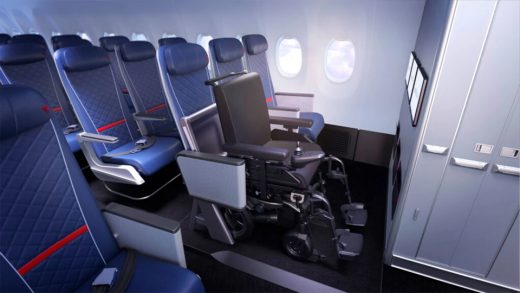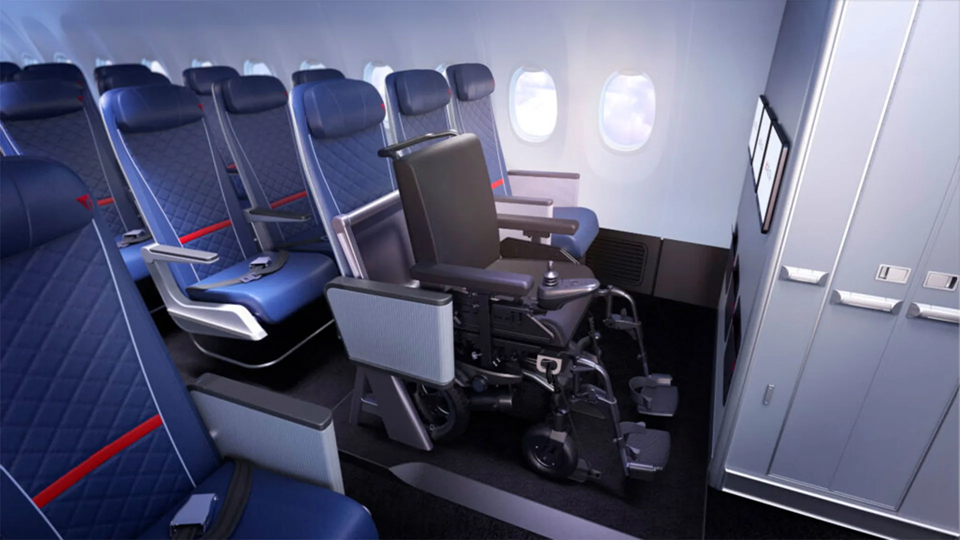DOT and Delta reveal plans for wheelchair-adaptive seats on planes
DOT and Delta reveal plans for wheelchair-adaptive seats on planes
With a focus on inclusion, Delta’s new seating will allow passengers to remain in their wheelchairs, ensuring a more comfortable journey.
BY Sarah Bregel
It’s been a long time coming, but air travel is about to get a little less complicated for travelers who use wheelchairs. This week, the Department of Transportation (DOT), the Federal Aviation Administration (FAA), and Delta Air Lines confirmed, per USAToday, that innovations are being made so that wheelchair users can remain in their wheelchairs while flying. The confirmation came after Rights on Flights, a campaign that seeks to systematically change air travel for the better for disabled passengers, announced the plans on social media.
The new design, which has been in the works since 2020, may sound like a minor adjustment, but wheelchair users know how challenging air travel can be. Disabled passengers routinely encounter issues like being treated disrespectfully before, during, or after flights. Issues like long wait times getting off of flights are not uncommon. And in recent years, a number of horror stories involving disabled passengers being forced to crawl or drag themselves through the aisle of a plane when help never arrived made headlines.
Suzanne Costas, a Boston-based social worker, outlined the horrors of flying while disabled in an LA Times opinion piece last year. “The ACAA prohibits discrimination of passengers with disabilities—I can’t be denied a seat on a plane—but that’s about where the protection ends,” Costas wrote. “The standards for accessibility features on aircraft are so appallingly inadequate, it’s like a cruel joke.”
The new seat design is not the only time that issues impacting travelers who use wheelchairs have been in the news lately. Just last week, the Department of Transportation (DOT) issued a $50 penalty against American Airlines for its treatment of disabled passengers. Not only did it allege that passengers who use wheelchairs are often given “undignified treatment” and “unsafe physical assistance” that even result in injuries, but it also stated that data revealed thousands of wheelchairs are mishandled, leading to damages or, maybe worse, not being returned to the passengers who rely them upon arrival.
“The era of tolerating poor treatment of airline passengers with disabilities is over,” U.S. Transportation Secretary Pete Buttigieg said in last week’s announcement. “With this penalty, we are setting a new standard of accountability for airlines that violate the civil rights of passengers with disabilities. By setting penalties at levels beyond a mere cost of doing business for airlines, we’re aiming to change how the industry behaves and prevent these kinds of abuses from happening in the first place.”
The latest news that passengers will be able to remain seated in their own equipment is a relief for disabled travelers, as well as those who have been fighting for their rights. Sophie Morgan, founder of the Rights on Flights, called it “the moment” the organization has “been waiting for.” Morgan continued, “This is the first step on a long journey towards change. Now, we call on all airlines to adopt this invocation and change the world for wheelchair users.”
The changes won’t happen overnight, as airlines will have to test and install the new seats and get the changes approved. But DOT is considering making it mandatory for airlines to install the new equipment.
Last year, Costas felt optimistic about DOT’s goal of creating a system that would allow disabled passengers to remain in their own wheelchairs, writing, “Talk about a game-changer! I’m telling you, airlines, if you build it, we will come.”
ABOUT THE AUTHOR
Fast Company
(6)



